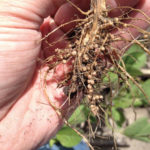Manitoba expat Barney Geddes, an assistant professor with the microbiological sciences program at North Dakota State University, likes to tell health care researchers how important the development of nitrogen fertilizer was. In terms of human lives saved, it’s had a greater impact than all innovations produced by medical science put together. “It’s sort of entertaining,”







